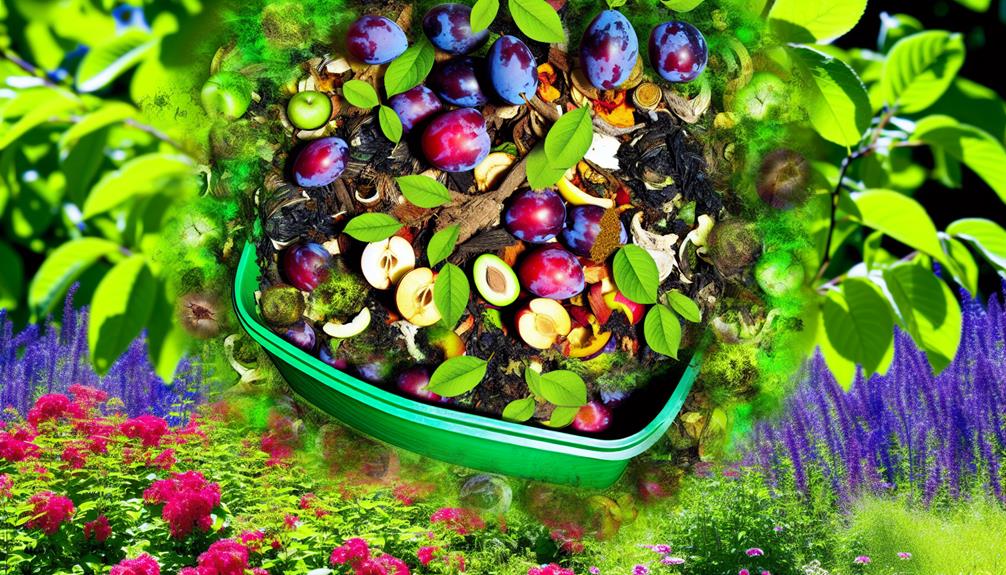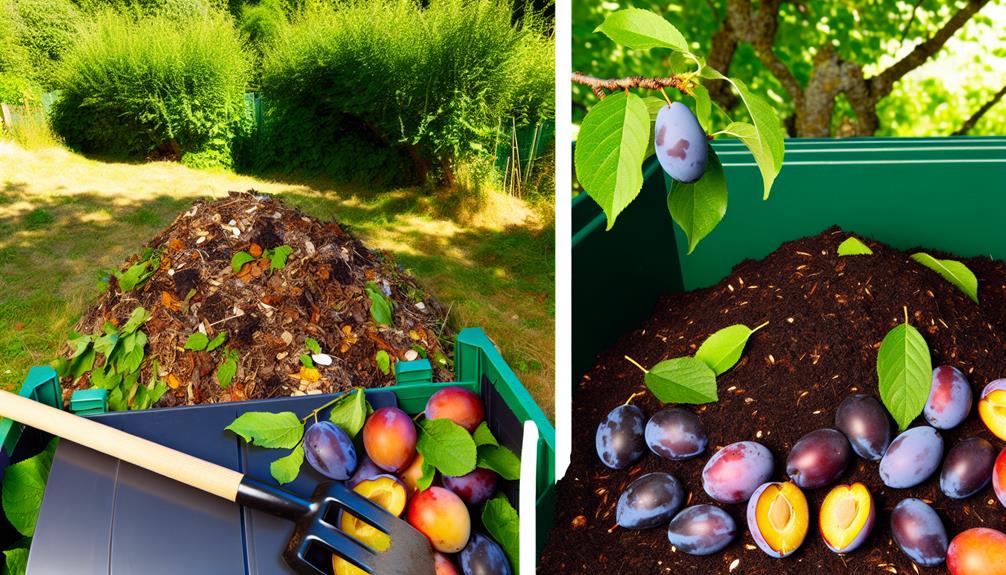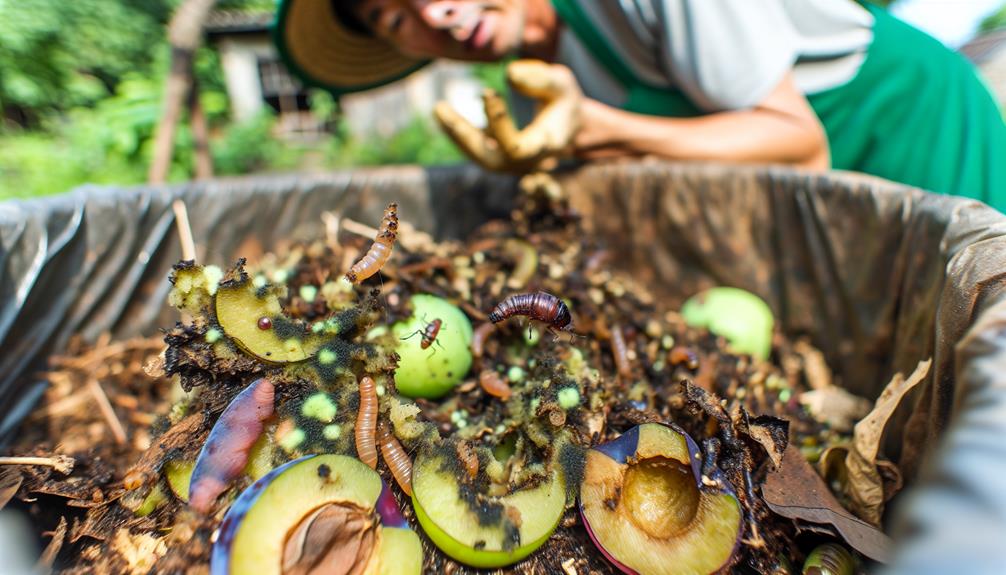

You can definitely compost plums, which enrich soil with essential nutrients. First, wash and cut plums into smaller pieces to speed up the process. For the pits, crack them open or grind them down to promote faster decomposition and reduce pest attraction. Balance moisture content by mixing plums with an equal ratio of green and brown materials until the texture is like a wrung-out sponge.
Troubleshoot common issues by burying food scraps deeper to deter pests and mixing in dry materials if your compost becomes too wet. Follow these tips to make your compost thrive and discover more efficient composting practices ahead.
Composting plums offers numerous benefits, enriching your soil with essential nutrients and reducing household waste. When you add plums to your compost pile, you’re actively participating in nutrient recycling. The organic material in plums decomposes and transforms into rich compost, which greatly enhances soil enrichment.
By composting plums, you’re creating a healthier, more fertile growing environment for your plants. The decomposed plums provide valuable nutrients like potassium, nitrogen, and phosphorous. These nutrients are vital for plant growth and can improve the structure of your soil. Better soil structure means improved water retention and aeration, making it easier for plant roots to access the nutrients they need.
Additionally, composting helps reduce the amount of organic waste that ends up in landfills. Instead of throwing away plum scraps, you’re turning them into something beneficial. This practice not only supports your garden but also contributes to a more sustainable lifestyle.
In your community garden or backyard, composting plums can become a shared activity that brings everyone together. It’s a simple yet effective way to promote environmental responsibility while fostering a sense of belonging and collaboration among fellow gardeners.
To get the most out of composting plums, you’ll need to prepare them properly before adding them to your compost pile. Start by washing plums thoroughly to remove any pesticides, dirt, or residues. This step guarantees that your compost remains as natural and chemical-free as possible.
Next, cutting plums into smaller pieces can help speed up the composting process. Smaller pieces break down faster, allowing for quicker integration into your compost. Use a clean knife and chopping board to slice the plums into manageable chunks.
Here’s a quick guide:
Step 1: Wash the plums to remove residues
Step 2: Use a clean knife
Step 3: Cut plums into smaller pieces
Step 4: Add to compost pile
Also Read: Can You Compost Cat Food?
Managing plum pits requires a bit more effort since they don’t break down as easily as the flesh. To start, consider cracking the pits open before adding them to your compost bin. This speeds up the decomposition process and allows the valuable nutrients inside to be recycled back into the soil more efficiently.

When dealing with plum pits, pest control is important. Whole pits can attract rodents and other pests looking for a snack. By cracking them open, you minimize this risk and help maintain a healthy compost environment. You can use a hammer or a sturdy nutcracker for this task.
Another approach is to grind the pits into smaller pieces. A sturdy blender or a specialized grinder can help you achieve this. The smaller the pieces, the quicker they’ll break down, contributing to nutrient recycling in your compost pile.
Remember to mix the cracked or ground pits well with other compost materials. This guarantees an even distribution of nutrients and helps maintain the right balance in your compost.
Once you’ve prepared your plum pits, it’s important to focus on balancing moisture content in your compost pile. Maintaining the right moisture level guarantees that organic matter breaks down efficiently, leading to nutrient-rich compost.
Start by balancing greens and browns. Greens, like fruit scraps and vegetable peels, add nitrogen and moisture. Browns, such as dry leaves, straw, and cardboard, contribute carbon and help absorb excess moisture.
To achieve the right balance, aim for a mixture that’s as damp as a wrung-out sponge. Too much moisture can cause the compost to become soggy and anaerobic, leading to unpleasant odors. Conversely, if it’s too dry, decomposition slows down significantly.
You can reduce waste by regularly adding kitchen scraps, including those plum pits, and mixing them well with browns.
Monitor the moisture content by turning the pile frequently. This aerates the compost, helping to evenly distribute moisture and prevent matting. If the pile feels too wet, incorporate more browns to absorb the excess liquid. If it’s too dry, add water gradually while mixing.
Also Read: Can You Compost Cardboard?
Encountering problems in your compost pile is common, but most issues can be easily resolved with a few adjustments. If pests are invading your compost, you’ll need to focus on pest control. Start by burying food scraps deeper into the pile. This reduces odors that attract pests. Avoid adding meat, dairy, or oily foods, as these can draw unwanted animals.

For odor management, consider the balance of green and brown materials. Too many green materials, like fruit scraps, can cause a foul smell. Adding brown materials such as dry leaves or shredded paper can help. Turn your compost regularly to aerate it and speed up decomposition, reducing odors.
If your compost is too wet, it can become slimy and smelly. Mix in dry, absorbent materials like straw or sawdust to restore balance.
Conversely, if it’s too dry, sprinkle water to maintain moisture.
Yes, composted plums can attract pests to your compost bin. To guarantee compost safety and effective pest control, always cover food scraps with brown materials and maintain proper moisture and aeration. You’re part of a responsible community!
Under ideal conditions, plums decompose in about 4-8 weeks. You’ll want to chop them up to speed up the decomposition rate. By doing so, you’ll contribute to a shared goal of effective, community-driven composting.
Yes, you can compost moldy or rotten plums. The moldy smell won’t be an issue, and the nutrient retention will benefit your compost. By doing so, you’re contributing to a healthier, more sustainable environment.
Yes, you should chop plums before adding them to compost. The chop size matters because smaller pieces decompose faster. Proper fruit preparation helps guarantee your compost breaks down efficiently, benefiting the whole community’s garden efforts.
You shouldn’t compost plums that show signs of plum diseases, as they can spread. Always remove the pits before composting to guarantee faster decomposition and a healthier compost pile. Keep your compost community thriving and disease-free!
To successfully compost plums, follow a few key steps.
Remove pits to prevent them from slowing down the composting process.
Chop the fruit to speed up decomposition.
Maintain a balanced moisture content—too dry, and it won’t break down; too wet, and it could become smelly.
Regularly turn the compost pile to keep it aerated.
By managing these factors, you’ll create nutrient-rich compost that benefits your garden.
